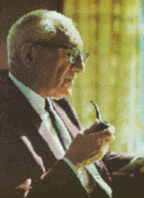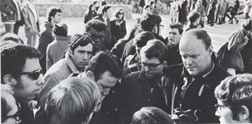1967-1968
 Brandeis began its turbulent 20th year with President Sachar’s announcement of his resignation; upon his successor’s assumption of office, he would become Brandeis University’s first and only Chancellor.
Brandeis began its turbulent 20th year with President Sachar’s announcement of his resignation; upon his successor’s assumption of office, he would become Brandeis University’s first and only Chancellor.
During the mid-60s, as Brandeis kept pace with the spread of political activism on campuses across the country, Sachar had found himself increasingly at odds with students and faculty. His final year as president was no exception.
—Staff
 Liberal Brandeis was more than ready to take part in the explosion of political feeling in the 60s. The passion for protest became almost all-consuming, as students missed no opportunity to make their voices heard.
Liberal Brandeis was more than ready to take part in the explosion of political feeling in the 60s. The passion for protest became almost all-consuming, as students missed no opportunity to make their voices heard.
—Staff
Protest at the Rabb Graduate Center
The fall semester was barely underway when controversy erupted over the opening of the Rabb Graduate Center. While ceremonies took place inside the new facility, picket lines formed outside, protesting the Rabb family’s business practices; their Stop & Shop supermarket chain sold grapes from California farms that employed poorly-paid migrant workers.
The Rabbs, whose generosity to Brandeis had been key to the growth of the university from the very beginning, were nonplused by the protest. The fallout continued for several weeks, as even those normally in sympathy with student causes questioned the wisdom of a protest which had not been preceded by any effort to meet with the Rabbs to discuss the problem. Inevitably, The Justice printed one opinion piece on the protest under the headline, “The Grapes of Rabb.”
Although Irving Rabb expressed some anger over what he saw as the students’ ingratitude for the generosity he and his family had shown the university, the Rabb family’s close association with Brandeis continued. Norman Rabb, the youngest member of the original university Trustees, was honored along with his wife in 1990 by the establishment of the Rabb School of Summer, Special and Continuing Studies.
Springer Chair
A more substantial challenge to administrative decision-making was the uproar over the endowment of a chair in history by the West German media magnate Alex Springer. The controversial Springer was already under fire at home, for his newspapers’ arch-conservatism and for his use of his own power to influence German politics. Although his newspapers’ agenda was fiercely pro-Israel, his own donations to Israel had been attacked by Holocaust survivors living there.
The announcement of Springer’s forthcoming contribution to Brandeis sparked an immediate response. A protest petition drafted by graduate students from West Germany had acquired signatures from half the faculty before it was officially submitted. The Justice printed a long letter from the wife of faculty member Herbert Marcuse obliquely suggesting that Springer appeared in World War II era photos in a Nazi uniform (Springer was excused from service for health reasons). Eventually, the controversy caught the attention of the West German press beyond Springer’s empire, appearing in publications like Der Spiegel.
Negotiations between Springer and the university continued in spite of the protest, concluding with the establishment of the Ottilie Springer Chair, named in honor of the publisher’s mother. The chair was established with the understanding that the funding would in no way impinge upon the occupant’s exercise of academic freedom, but Springer drew his own benefits from his accomplishment. Only weeks later, Springer countered attacks on his politics by calling attention to his donation to a widely-recognized liberal institution, Brandeis University.